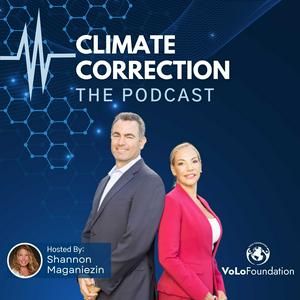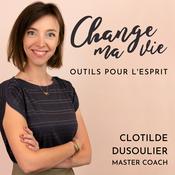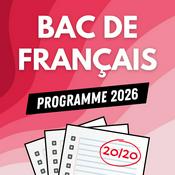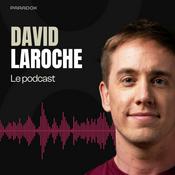140 épisodes
- February 2026 | Season 6, Episode 131
The Road after COP30 Starts in the Ocean
In this episode of the Climate Correction Podcast, we explore why the future of climate action, food security, and biodiversity is inseparable from the ocean. The conversation centers on the growing recognition that fish, seaweed, and other aquatic foods are not just economic resources, but climate-smart nutrition solutions with an outsized role in building resilient food systems.
Our guest is Karly Kelso, Acting Senior Director of Global Ocean Strategies at the Environmental Defense Fund. Karly sits at the intersection of food, climate, and ocean policy, leading EDF's global aquatic foods work and serving as Secretariat for the Aquatic Blue Foods Coalition. She works closely with governments, civil society, the private sector, and UN climate processes to ensure aquatic foods are embedded in global climate and food policy conversations. With more than fifteen years at EDF, her work has helped shape sustainable fisheries management and ocean resilience efforts worldwide, including oversight of EDF's fisheries initiatives in India.
The conversation reflects on a rare moment of global alignment in 2025, when major international convenings on ocean, climate, and biodiversity finally converged around a shared narrative. For the first time, aquatic foods emerged not as a side topic, but as a central solution linking climate mitigation, human nutrition, livelihoods, and ecosystem health. Karly explains why this alignment felt different, and how it opened the door for more integrated, systems-level thinking.
We also dig into the growing momentum to recognize "blue foods" as a climate solution. Fish and seaweed provide high-quality protein and essential micronutrients with a significantly smaller climate footprint than most land-based foods. Yet, as countries look to scale aquatic foods in future food systems, Karly emphasizes that equity must remain core, ensuring coastal communities, small-scale fishers, and Indigenous Peoples benefit, rather than repeating patterns of industrial exploitation.
A major focus of the episode is the deep ocean, particularly mesopelagic fish, a group of midwater species that most people have never heard of, yet which play a critical role in moving carbon from the ocean surface to the deep sea and supporting marine food webs. Karly explains why these species are essential to climate regulation and why growing interest in harvesting them for fishmeal and fish oil raises serious red flags. Drawing lessons from past ocean exploitation, she outlines why scientists and organizations like EDF are urging caution.
Despite major data gaps about the deep ocean, EDF and partners successfully advanced IUCN Motion 035 to protect mesopelagic ecosystem integrity. Karly walks us through why acting now, before unregulated fishing begins, is so important, and how precautionary protections can safeguard climate benefits while science catches up.
We close with a grounded discussion on agency and accountability: what consumers and voters can actually do to protect the ocean, support science-based decision-making, and push for food systems that are both climate-smart and fair. This episode makes one thing clear: The road after COP30 doesn't just run through land and policy halls. It starts in the ocean.
Learn more about Blue Foods:
https://aquaticbluefood.org/
https://fisherysolutionscenter.edf.org/resources/aquatic-blue-food-coalition The Interconnectivity of Everything in the Ocean with Leneita Fix of The Reef Institute
02/1/2026 | 34 minIn this episode of the Climate Correction™ Podcast, we're joined by Leneita Fix, founding leader and executive director of The Reef Institute, one of Florida and the Caribbean's most important hubs for coral rescue, restoration, and ocean literacy. Leneita shares how The Reef Institute's groundbreaking Rescue to Reef model is transforming the future of coral conservation through a full-spectrum approach that includes emergency rescues, long-term holding and biobanking, indoor coral spawning, juvenile rearing, and strategic outplanting back into the wild. With more than 8,000 corals from 28 Caribbean species under their care, the organization is safeguarding genetic diversity while supporting scalable, community-driven restoration efforts across the region.
Leneita breaks down the surprising biology and physiology of corals. Most people don't know that corals are animals whose "gut health" exists on the outside of their bodies. She explains why the biodiversity of a reef is inseparable from the survival of both stony reef-building corals and soft corals. She walks us through the world of coral reproduction, including IVF and land-based spawning, and shares what it takes to raise juvenile corals strong enough for outplanting in a warming, increasingly acidic ocean.
Together, we explore why coral reefs are essential not only for marine ecosystems but for human life. As carbon pollution overwhelms the ocean's ability to absorb it, reefs face compounding threats, from heat-induced bleaching to stronger wave energy that breaks down weakened structures. Leneita connects the dots between reef decline, coastal vulnerability, ocean oxygen production, and the health of life on land, reminding us that the ocean's stability is inseparable from our own.
This inspiring conversation highlights the urgent need for bold, collaborative conservation and the hope found in community-centered stewardship. Leneita's leadership illuminates how science, education, and local partnerships can rebuild resilience from the seafloor up.
Tune in for a powerful look at the interconnectedness of everything in the ocean and why restoring coral reefs is an essential step toward a livable future for all.
Links from the Show:
Connect with our Guest: https://www.reefinstitute.org/
Watch the Peanut Island Mini-Documentary by Walker Wildlife: https://www.youtube.com/watch?v=NIZLW0oK-h8
The Reef Institute Facility Update (2026): https://www.youtube.com/watch?v=QvPpecrRl5I&t=10s
The Coral Tipping Point (Article): https://www.theguardian.com/environment/2025/oct/13/coral-reefs-ice-sheets-amazon-rainforest-tipping-point-global-heating-scientists-report
Functional Extinction of Acropora Species (Research Paper): https://www.science.org/doi/abs/10.1126/science.adx7825- In this special holiday episode of Climate Correction Podcast, we welcome Dr. Pablo Ribeiro Dias, co-founder and chief technology officer at SOLARCYCLE, a pioneering, tech-driven recycling company producing sustainable, domestic materials at scale for the solar industry. Dr. Dias is a world-renowned researcher in solar PV module and e-waste recycling technologies. He leads innovation in high-value, low-cost recycling processes that are shaping the future of renewable energy.
With dual PhDs from UFRGS (Brazil) and Macquarie University (Australia), and a master's in photovoltaics recycling, Dr. Dias has authored seminal papers, book chapters, and multiple patents that advance the field of photovoltaic recycling. His research and thought leadership have been featured in The Guardian, Cosmos, PV Tech and Solar Power World. In 2023, Business Insider named him among its Climate Action 30, which recognizes thirty global leaders building real climate solutions.
As we close the year, Dr. Dias shares insights from his new book, Climate Changed: The Science of Sustainability and How Each of Us Can Do Our Part. The book is a perfect stocking stuffer for the climate-conscious reader. He invites us to reimagine sustainability through systems thinking, circular design and a regenerative mindset that scales solutions without sacrificing justice or humanity.
Key Points:
Climate change isn't a mystery. It's a systems problem. We can redesign our economic, energy, and material systems to be regenerative rather than extractive.
Sustainability = Systems + Scale, leaving nobody out of the equation. True sustainability ensures scalability without exploitation.
Circular economy ≠ recycling. It's about reimagining products and industries for repair, reuse, and reintegration.
Individual action multiplies change. When people act collectively, through voting, investing, and innovating, the impact compounds.
Hope is a discipline, not a mood. The future remains unwritten, and data-driven optimism fuels transformation.
What does living sustainably in the 21st century really mean? It's about alignment across energy, agriculture, and materials to build a livable planet for all.
Episode Links:
pablodias.net
SOLARCYCLE LinkedIn: https://www.linkedin.com/company/solarcycle-inc/ - Show notes for this episode come from an article that has been republished with approval from the author, Carlos Roa. See the original article here.
As billions of garments end up in landfills each year, Catherine Valdivieso's SwapCo app makes sustainable fashion simple by helping users "swipe, match and swap" clothes while curbing overconsumption this holiday season
By Carlos Roa
According to Earth.org, the fashion industry produces more than 100 billion garments each year, and an estimated 92 million tons of them end up in landfills. That is the equivalent of a garbage truck full of clothes dumped every second.
The same source states that if nothing changes, that figure could rise to 134 million tons by the end of the decade, while the industry's carbon emissions are projected to increase by 50 percent by 2030.
To help reverse that trend, Catherine Valdivieso, CEO and founder of SwapCo, created an app designed to make sustainable fashion social, local, and easy. SwapCo works like a "dating app for fashion": users upload photos of their clothes, swipe to find matches, and connect with others to swap items in person. No packaging, no shipping, no waste.
With record levels of clothing waste worldwide, Valdivieso's work comes at a crucial time. As the holiday season approaches, her message is simple: slow down consumption and rediscover joy in conscious fashion choices.
"I wanted to show my kids that small actions matter," she said.
Catherine, what gave you the idea to create SwapCo?
It began as a personal wake-up call. I watched The True Cost, a documentary about the dark side of fast fashion, and I was shocked. It made me question my own habits. I tried renting clothes, but everything came wrapped in plastic and shipped across the country. It just didn't feel sustainable. I thought, what if there was a local, people-driven alternative? That's how SwapCo was born.
You've mentioned that your children inspired you to pursue this mission.
Absolutely. I think about the world they'll inherit, one where climate challenges and waste are daily realities. I wanted to set an example. SwapCo is my way of showing them that small, individual actions can create meaningful change when multiplied by millions.
Every year, 92 million tons of textile waste are generated worldwide. In the U.S. alone, the average consumer discards 81.5 pounds of clothing, about 2,150 pieces per second nationwide. When you hear numbers like that, what goes through your mind?
It's staggering. But it also gives me hope. If we can extend the life of garments through systems like SwapCo, we can dramatically reduce that mountain of waste. Clothes shouldn't be disposable; they should tell stories and live many lives.
Why do people find it so easy to throw clothes away?
Because fast fashion made it normal. We're used to buying cheap items, wearing them once or twice, and tossing them. Social media reinforces that; people don't want to repeat outfits. SwapCo flips that script. Instead of discarding clothes, you can give them a second life and get something "new to you" in return. It's fun, social, and sustainable.
For those who haven't tried it, how exactly does SwapCo work?
Imagine if Poshmark and Tinder had a baby. You upload photos of your clothes, swipe right or left to find a match, and when both people agree, you chat to arrange a local meet-up. There's no shipping, which means fewer emissions and more community interaction.
"We're changing how people see secondhand fashion"
Some people still see used clothes as old or low-quality. How are you changing that mindset?
By reframing the experience. When you open SwapCo, you see beautiful, trendy items, treasures waiting for new stories. It's about style, not sacrifice. And because you're connecting with real people, swapping becomes social and meaningful.
We've seen incredible stories. One student swapped an outfit for her first job interview, and she got the job. Others have made new friends at swap events. Some users even suggested expanding the app beyond fashion to books or sports gear. That sense of community is what drives me.
Beyond swapping, what sustainable habits do you personally follow?
I try to buy less, choose natural fabrics like cotton or linen, and mend or upcycle what I already own. I also share clothes with friends. The key is progress, not perfection. Small changes add up when we all do them.
"During the holidays, give experiences, not just things"
The holidays are approaching, a time when consumption spikes. How can people make it more sustainable?
It's all about intentionality. Instead of buying new, consider giving experiences, like a trip or a meal together, or secondhand gifts that tell a story. A pre-loved item can carry more meaning than something new from a store.
And what would you say to those who still want to enjoy fashion and gift-giving while being mindful?
Focus on creativity. Swap an outfit for your holiday party. Gift something with a story. Conscious fashion isn't about deprivation; it's about finding joy in choices that are better for people and the planet. Beyond Rooftops: How Solar Builds Communities with GRID Alternatives Co-founder Erica Mackie
24/9/2025 | 25 minWhat if clean energy wasn't just about powering our homes, but about powering opportunity? My guest today believes renewable energy can be the bridge to economic justice, workforce empowerment, and a more inclusive future.
On this episode of the Climate Correction Podcast, I'm joined by Erica Mackie, P.E., co-founder and Co-CEO of GRID Alternatives, the nonprofit that has turned solar into a tool for community transformation. From day one, Erica has led GRID's growth into a national force—bringing renewable energy technology and job training directly to underserved communities. Along the way, she's collected some of the most prestigious awards in environmental leadership, but her true focus is on impact: lowering energy bills, cutting carbon emissions, and opening doors to life-changing careers.
We'll explore:
Why clean energy and gender equity are more connected than you think.
How GRID is doubling down on equity and inclusion even as those programs are being rolled back nationally.
The ways workforce training in renewable energy is creating wealth-building opportunities that ripple through entire communities.
Real stories of people whose lives have been changed when access to solar power and job training collided.
The data that proves GRID's impact—from gigawatts installed to jobs created.
And what's next: from localized solutions like transportation electrification to the bold plans GRID has for scaling across the country.
If you've ever wondered how renewable energy can move beyond rooftop panels and into the heart of social and economic justice—this conversation will open your eyes.
Plus de podcasts Éducation
Podcasts tendance de Éducation
À propos de Climate Correction™ Podcast
Looking for our Spanish Podcast? Listen here: https://volofoundation.org/es/climate-correction-podcast/
David S. Vogel is a world-renowned data scientist and predictive modeler. He has won the prestigious KDD Cup several times and the Heritage Health Prize in 2013. His wife, Thais Lopez Vogel, an attorney, manages VoLo Foundation. Together, they are raising six kids. David's research led them to become aware of the devastating economic impact of carbon pollution. They knew they had to do something for their kids and future generations.
VoLo Foundation exists to be the bridge between the science community and everyone else. The Foundation's work accelerates change and global impact by supporting science-based climate change solutions, enhancing education, and improving health.
Climate Correction™ is the premier climate solutions event in the Southeast. The main stage event brings top minds in climate solutions to one stage. Now, their cutting-edge research and solutions-focused education are available for streaming all year long on VoLo's Climate Correction Podcast.
Podcast Host Shannon Maganiezin leads VoLo Foundation's public-facing initiatives, working closely with the press, media, and strategic partners to amplify VoLo's mission and impact.
Learn More https://volofoundation.org/climate-correction-podcast/
Site web du podcastÉcoutez Climate Correction™ Podcast, Le Podkatz ou d'autres podcasts du monde entier - avec l'app de radio.fr

Obtenez l’app radio.fr gratuite
- Ajout de radios et podcasts en favoris
- Diffusion via Wi-Fi ou Bluetooth
- Carplay & Android Auto compatibles
- Et encore plus de fonctionnalités
Obtenez l’app radio.fr gratuite
- Ajout de radios et podcasts en favoris
- Diffusion via Wi-Fi ou Bluetooth
- Carplay & Android Auto compatibles
- Et encore plus de fonctionnalités


Climate Correction™ Podcast
Scannez le code,
Téléchargez l’app,
Écoutez.
Téléchargez l’app,
Écoutez.







































